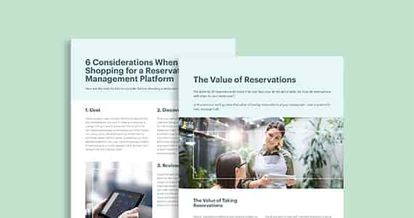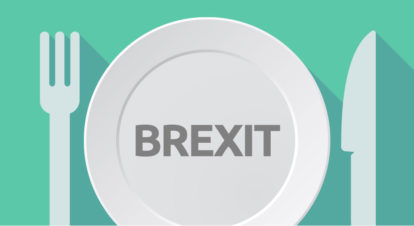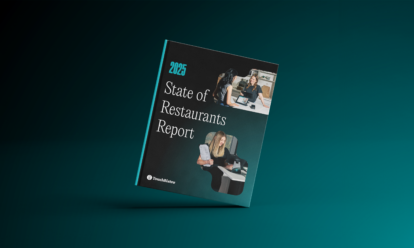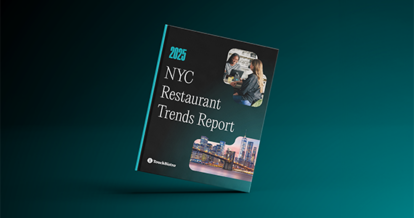“I’m going to open a restaurant and I’m going to open it today,” said no one ever.
Beyond financing, renovations, staff, tech, decor, and other important things, like … I don’t know … say … your menu! … there’s the laborious, lengthy, no-fun process of obtaining licensing.
*Collective sigh*
We feel you.
Going through the process to get all those licenses might make you feel like kicking, screaming, crying, and everything in between, but you’ve gotta do what you’ve gotta do. Here are eleven licenses that restaurants looking to set up shop on US shores need to acquire.
Employer Identifier Number (EIN) Number
This is a non-negotiable. Your Employer Identifier Number is a unique number made especially by the IRS for you, dear business owner! How kind of them. As its name suggests, this number is what identifies you to the IRS for tax purposes. The easiest way to apply for this free number is through the IRS website, which produces your EIN number immediately. If you apply by phone, fax, mail, or carrier pigeon, the process will take anywhere from one to five weeks.
Business License
State, and in many cases, federal business licenses are needed in order to operate within the jurisdiction of your choice. In all cases, your restaurant will need a state license. But if your restaurant sells alcohol – cheers to that – or other federally regulated wares, you’ll have to get a federal license as well. State licenses typically involve a small processing fee. For example, the State of Washington charges $19, whereas good old Nevada charges $200.
Seller’s Permit
This is the number that identifies you as a business entity that collects sales tax. If you have multiple restaurants or take over a restaurant from another owner, you’ll still have to get a shiny new seller’s permit. While the requirements vary from state to state, often there’s a small administrative fee and sometimes even a security deposit.
Resale Permit
The resale permit goes by many names, including: reseller’s license, reseller’s certificate, resale license, sales tax ID or sales tax permit. Each tastes equally as sweet. It allows you to purchase food at wholesale prices sans sales tax and then resell it at retail prices which includes tax. This is so that the customer pays the tax on the final purchase, taking the tax onus off the reseller. Hands in your pocket, there’s a menial fee associated with this permit too.
Certificate of Occupancy
Is your building up to code? Basically, this certification states that your restaurant is indeed up to code and suitable for patrons to dine in. You have to apply for a certificate of occupancy whenever a new building is constructed, a space is converted for a new purpose, or occupancy or ownership changes. These are issued by the local government after all inspection requirements have been passed to ensure that the ceiling your future guests will be dining under doesn’t cave in. The cost of this permit fluctuates from jurisdiction to jurisdiction and can be anywhere between tens of dollars to a couple hundred.
Food Handlers Permit
For every restaurant handling food, a food handlers permit is required. The permit stipulates that there must be one person on-site at all times who has completed their food handlers certification. Often this is done by owners and managers or the employees who spend the most time at the restaurant. The course covers food hazards, personal hygiene practices, cleaning and sanitizing processes, and time and temperature controls. In many states, it can be completed online for as low as $10. In order to pass the test, you need a grade of 70% and you only get two attempts, so study up!
Worker’s Compensation
The old “slipped on a banana peel and sue your employer for a gazillion dollars” scenario. That’s why there’s worker’s compensation, which pays for medical expenses and compensates part of lost wages if an employee is hurt on the job. This coverage is state determined, with 49 states requiring it no matter how many employees you have.
Health Operational Permit
Transparency is everything. It’s standard practice: if you sell any edible goods, you have to make yourself available for health inspection so that the state and your patrons can be confident that you’re running a clean, hygienic, up to code food operation. You apply for this permit through you local health department. Upon receiving it, you’re subject to supervision under the health authority, so look alive! They have the power to suspend your services if you’re not up to code or issue you tasks to complete after their periodic inspection.
Sign Permit
Unfortunately, no, despite your marketing whimsy, you can’t just paint the town with your logo. In order to announce your brand to the world, you must apply for a sign permit and abide by the restrictions on the type, lighting, location or size of the signs you choose to use. Fines for sign infractions can top $15,000 per day in a city like Chicago, so paying the initial few hundred dollars for the permit is well worth it.
Music License
Just like Napster, the days of businesses playing free music are gone. Ignore these rules and you could be subject to hefty fines. How hefty you ask? We’re talking fines in the tens of thousands of dollars for playing a single unlicensed song. While you can pay directly to Performance Rights Organizations (known as the PROS), this gets costly fast because not all music is covered under a single organization. If you choose to go directly to the PROS, you’d need multiple licenses and research which song belongs to which PRO to ensure you have the license to play it. The alternative is to use a subscription service like Siriusxm for Business or Spotify’s business streaming service, ‘Soundtrack’. Not only do these cost between $25 and $35 a month, but they take care of the dirty work of selecting individual tracks and managing the licensing. If you want more important on music licensing for your venue, this blog post covers all of the important details.
Liquor License
If you want to cash in on those happy hour clients, the benefits of the liquor upsell and the late night crowd, getting licensed to serve is essential. These are distributed state by state and determine the when, where, what, why and hows of liquor sales. Often, liquor license distribution authorities impose limits on the number of drinks per customer, costs like no discounts allowed on drinks and restrict carrying open bottles of alcohol out of the restaurant. Some establishments also have to get a beer and wine license, which doesn’t include spirits, or a tavern license when sales are 50% liquor.
So there you have it. Operating a restaurant without all of the required licenses is risky business, so do your research on which of the above are needed for you venue. You’ll be glad ya did.
Download our free inventory template
Sign up for our free weekly TouchBistro Newsletter







